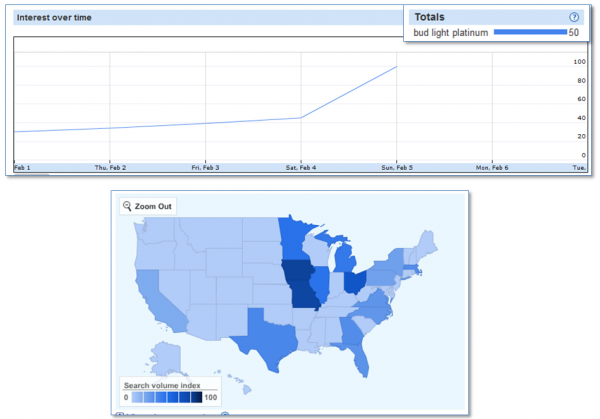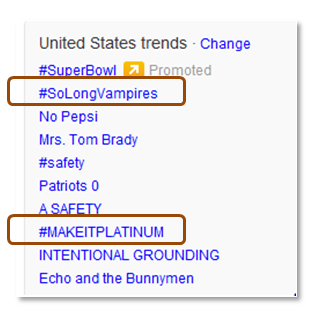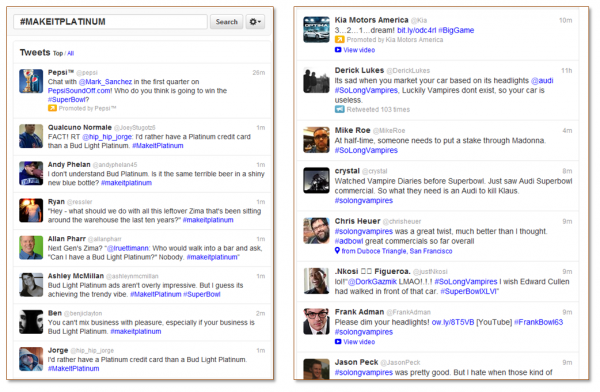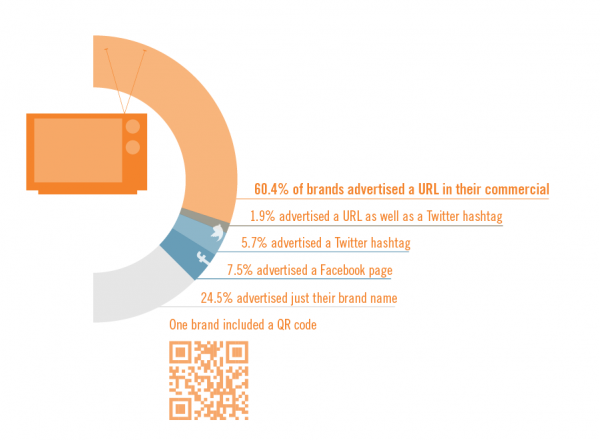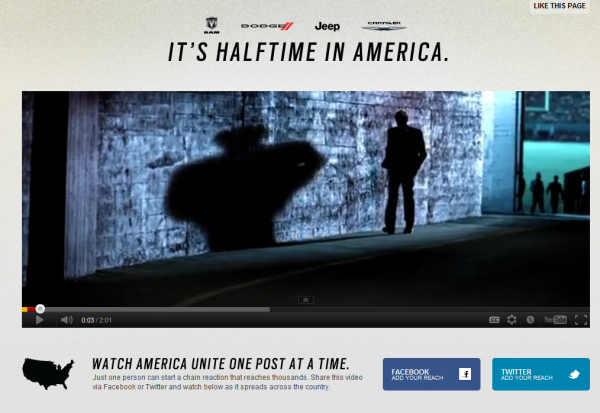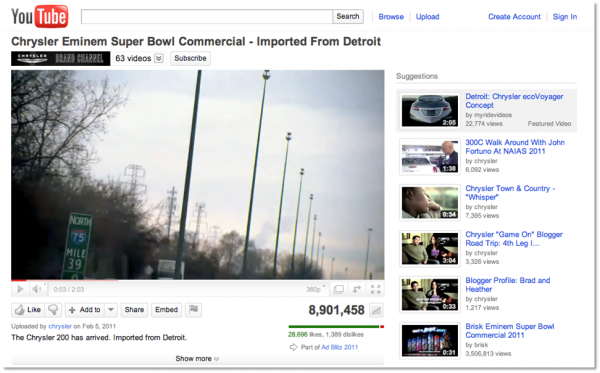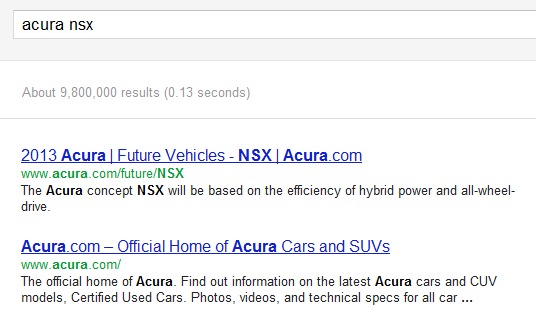Did Super Bowl Advertisers Take Advantage of Search Interest?
Over the past couple of days, numerous stats and figures have been published about how Super Bowl advertisers took advantage (or not) of social media this year. But commercials also drive people to search engines, which in turn (when things go right) can lead potential customers to advertiser web sites where rather than talk about […]
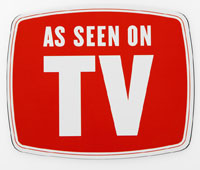 Over the past couple of days, numerous stats and figures have been published about how Super Bowl advertisers took advantage (or not) of social media this year. But commercials also drive people to search engines, which in turn (when things go right) can lead potential customers to advertiser web sites where rather than talk about a brand as they can on social media sites, they can watch the commercials again, cementing brand messaging, and take a closer look at the products being sold. (Which is presumably why a company would spend $3.5 million dollars on a thirty second spot in the first place.)
Over the past couple of days, numerous stats and figures have been published about how Super Bowl advertisers took advantage (or not) of social media this year. But commercials also drive people to search engines, which in turn (when things go right) can lead potential customers to advertiser web sites where rather than talk about a brand as they can on social media sites, they can watch the commercials again, cementing brand messaging, and take a closer look at the products being sold. (Which is presumably why a company would spend $3.5 million dollars on a thirty second spot in the first place.)
Commercials Drive Searches
Since the 2009 Super Bowl, I’ve monitored how the ads influence search interest, and every year, the trend has been the same. As people watch the Super Bowl, they search for everything they’re watching: teams, players, performers, and of course, commercials. The trend continues the day after the game as people talk about the commercials and turn to Google (and Bing) to watch them again. Take a look at the spiking searches for February 7th, the day after the game according to Google Trends:
Nearly every search is Super Bowl related, and searchers are clearly seeking out the ads. As you can see from search #8, commercials often cause people to search for the brands directly. Google Insights for Search shows that brands that advertised saw significant search spikes on Sunday. See for instance, the search volume for [bud light platinum].
They seemed to have really liked those ads in Iowa.
Google reported that searches for [super bowl ads] were 122 times higher this week and that the big search winners were Acura, GoDaddy, and M&Ms.
Where Are Advertisers Sending Potential Customers?
As I do every year, I took note of what advertisers included in the commercial. Did they include a web site URL? A Facebook page? Did they seem to even be aware of this crazy new thing called the internet? And then I looked at the advertisers’ search visibility. I was looking for the following flow:
Last year, many only paid attention to a flow like this:
I understand that Super Bowl commercials are about branding, not necessarily instant purchases, and I realize other positive outcomes exist (discussions on social media and the like). I’m just saying that if someone is searching for you, you may as well show up. And if you’ve gotten potential customers to view your commercial, you may as well make it easy for them to view more information about your products.
This year, many advertisers simply included their domain name in the ad (33 of the 53 advertisers I tracked did this). This approach can help cut out the search step, although as the response to the Dockers ad during the 2010 Super Bowl showed, advertising a URL causes people to, well, search for the URL. So you can’t always cut out the search step, no matter how hard you try.
Last year’s Super Bowl ads were all about Facebook fan pages (that often were impossible to find; don’t say “find us on Facebook” unless that’s an achievable task). This year, only fourof the ads included a nod to Facebook and all used actual URLs. Pepsi Max even went with an easy to remember redirect to Facebook: pepsimax.com/facebook.
Four commercials advertised Twitter hashtags (last year was the first year for this, and then it was mostly only for movie trailers). I was astonished to find that when a hashtag was included in a commercial, people instantly started using it to tweet about the commercial and the hashtag began trending. (As you can see, even the bands with songs in the commercials started trending.)
Of course, there’s a risk in this strategy. Things may go really well, as Audi found with #SoLongVampires, or very awry as Bud Light found with #MAKEITPLATINUM. (Did people really even use the same capitalization in the hashtag as was used in the commercial? Amazing.)
What began trending on Twitter also tended to show search spikes. For instance, take a look at searches for [echo and the bunnymen]:
So what we talk about, we also search for.
The Future is… QR Codes?
It may have seemed like GoDaddy used the same tired formula as always in their ads (although, apparently sex does sell, so I can’t knock sticking with something that works), but in fact, they tried something new this year: including a QR code in the ad.
The online version of the commercial includes the QR during the entire length of the ad, but when aired during the Super Bowl, it appeared only briefly at the end, so I’m not sure if anyone managed to pull up the QR code reader on their mobile phone, rush to the TV, and scan it before it disappeared from the screen. Including it in the online version seems even more nonsensical though, as the idea seems to be that you’re watching the ad on your computer, see the QR code, scan it with your phone, and are brought to the godaddy.com site on your phone. I would guess that including a link to the web site in the commercial so that you can simply click and access the web site on your computer would make entering your credit card information for all those domain names quite a bit easier.
Scoring Search Visibility
So how did advertisers do in search? It’s difficult to come up with exact search coverage percentages. For instance, if a brand advertised multiple products and ranked well in search results for one product but not the other does the tick mark for that brand go in the yes or no column for search visibility? What if the product showed up for its name but not for its tagline?
For the purposes of the stats below, I used the following guidelines:
- I counted each brand once, even if they aired ads for multiple products
- If they ranked organically for at least one of brand, product, or tagline queries, I put a yes in the organic search column
- If they had a paid search ad for at least one of brand, product, or tagline queries, I put a yes in the paid search column
In a follow up column, I’ll point out some interesting choices, but for now, let’s just look at how well advertisers thought out web sites, search, and social media.
Of the 53 brands I tracked:
- 33 ended the ad with a URL to the brand site, 4 went with a Twitter hashtag, and 4 sent viewers to Facebook.
- 44 bought a paid search ad
- 51 ranked organically for the brand name (although far fewer ranked for the promoted taglines or hashtags)
Chrysler and YouTube
Last year, Chrysler’s Eminem ad was one of the most popular commercials of the game. I found it odd at the time that although they designed their site’s home page to tie in quite well to the vibe of that ad, they bought search ads to the commercial on YouTube. I felt they lost an opportunity to further interact with potential customers and lost some control of the experience (related videos could easily be to competitors, for instance). Their flow looked like this:
That’s not a bad outcome, but I thought that if they had used paid search to drive visitors to the commercial on their site, they might have been able to better leveraged the opportunity. This year, Chrysler once again had a much-talked-about ad, and they decided to mix things up a bit.
For [chrysler]-related searches, the paid search ad points at their home page, which is a great tie in to the commercial. But for other searches, they’ve once again chosen to promote YouTube.
This time, the YouTube link makes a lot more sense as it’s to the channel, so there are no competitor links and the entire page is focused on getting votes for the YouTube AdBlitz, engaging socially, and even includes an ad for the car featured in the commercial. All in all, I fully support this approach. They keep the branded searches pointing at their home page (after all, not everyone searching for the brand is searching for the commercial), which is tightly-integrated with the campaign, and they send those looking for the commercial to a page designed to specifically engage with them. What a difference a year makes.
2012 Paid Search Ad to YouTube:
2011 Paid Search Ad to YouTube:
Acura NSX vs. Bud Light Platinum
We’ve already seen that the #makeitplatinum hashtag strategy both worked and didn’t work for Bud Light (they definitely got it trending, but for perhaps the wrong reasons). What about organic search visibility? Sadly, the brand web site doesn’t appear at all in Google for searches for [bud light platinum] (although they have bought a paid search ad to the YouTube page).
Acura NSX, on the other hand (which was a spiking search on Monday), does an excellent job with organic search, taking the top spot with a page devoted to it. (Although including the commercial on the page would have been a good idea.)
Overall, I felt brands did a much better job of keeping things simple and driving viewers to interesting, relevant pages that engaged them. Watch for my next post in the coming days for some specifics on what went right and spectacularly wrong.
Related:
Contributing authors are invited to create content for Search Engine Land and are chosen for their expertise and contribution to the search community. Our contributors work under the oversight of the editorial staff and contributions are checked for quality and relevance to our readers. The opinions they express are their own.
Related stories
New on Search Engine Land

